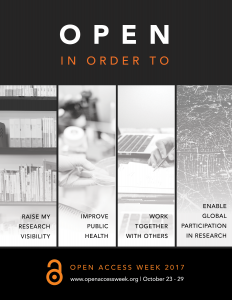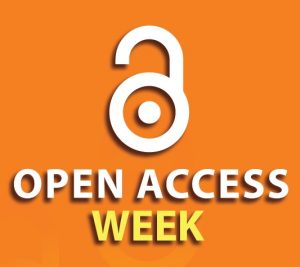 “Open in Order to” is the theme of 2017’s Open Access Week.
“Open in Order to” is the theme of 2017’s Open Access Week.
“Open in order to” invites us to share our reasons for making our research, data, journal articles, and educational materials openly and freely available! Below are examples of the ways people and groups at JHU have openly shared research and educational information.
Open Access to Research Articles
Why do researchers make their articles freely available? Many do so because because the funder requires it; examples of this include the NIH Public Access Policy and the OSTP memo of 2013. Often researchers want to make their research available as soon as possible, to move science forward quickly and to “stake their claim.” Sometimes researchers want to avoid using commercial publishers. Often they want the general public to have access to the research, to improve public health or let study participants see the articles. There are other reasons, as well. Below are links to sets of articles made freely available by JHU authors on different Open Access platforms; there are many more open articles authored by JHU researchers out there.
Open Educational Resources (OER)
 OERs give faculty the ability to reuse and tailor teaching materials to suit their course needs. OERs also keep money in students’ pockets by reducing the cost of a textbook to zero. There are several institutions and groups creating and promoting the use of OERs at the college level.
OERs give faculty the ability to reuse and tailor teaching materials to suit their course needs. OERs also keep money in students’ pockets by reducing the cost of a textbook to zero. There are several institutions and groups creating and promoting the use of OERs at the college level.
Here at JHU, Marian Feldman, History of Art and Near Eastern Studies, needed up-to-date materials to teach a course on Mesopotamian art. Dr. Feldman was awarded a Technology Fellows grant from the Center for Educational Resources to create openly available educational material about Mesopotamian art.
On a larger scale, the Bloomberg School of Public Health shares many of its educational materials with the world on the JHSPH Open Courseware platform. The School of Public Health clearly makes a connection between their mission: Protecting Health, Saving Lives – Millions at a Time, and providing open educational materials to the world.
Open Books
 Open Access books (that aren’t textbooks) are less common than Open Access articles. I know of only one JHU author who has made their book openly available. If there are others, please tell us about them in the Comments.
Open Access books (that aren’t textbooks) are less common than Open Access articles. I know of only one JHU author who has made their book openly available. If there are others, please tell us about them in the Comments.
Lester Spence’s book Knocking the Hustle was freely available as an ebook six months after publication. At the end of an interview in the Hub, Spence talks about his reason for this choice.
Open Data
Since there are many open data repositories, it’s difficult to find where individual JHU researchers have posted open data. Instead I’ve provided some examples of open data sets that JHU makes openly available.
